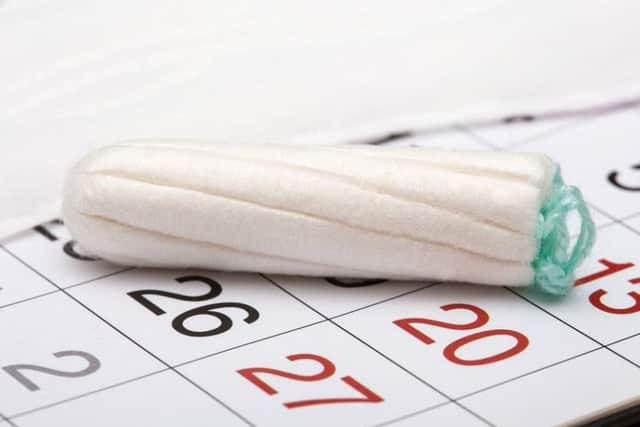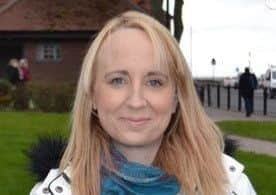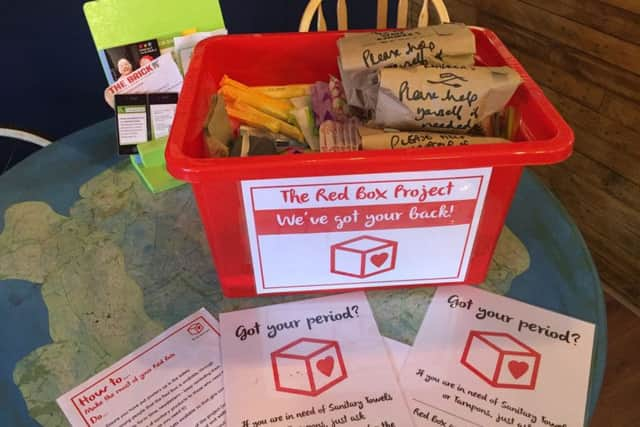Sunderland Council to provide free sanitary products as part of ‘period dignity’ campaign
and live on Freeview channel 276
Councillors last night voted to back Unite’s ‘period dignity’ campaign – a national drive to tackle period poverty and make products more accessible.
A motion, presented at Sunderland Civic Centre, stated that one in 10 girls and women aged 14-21 are unable to afford sanitary products.


Advertisement
Hide AdAdvertisement
Hide AdIn the UK, almost 140,000 girls and young women, particularly girls in receipt of free school meals, missed school last year due to lack of funds.
The decision, which was backed by Labour, Conservative and Liberal Democrat and Others groups, will see the council sign up to several pledges.
This includes providing free sanitary products in all council buildings, and encouraging local employers to provide them on site for staff and visitors.
All city schools will also be encouraged to back the scheme, “given the increasing number of girls beginning their periods as early as age eight,” the motion reads.


Advertisement
Hide AdAdvertisement
Hide AdCoun Kelly Chequer, launching the motion, said it aimed to “break the silence” around periods, both in the council chamber and the wider community.
“Especially the shame experienced by those girls and women who are suffering the undignified embarrassment of period poverty,” she explained.
“As a woman who was once a schoolgirl, I can remember the shame around periods. This humiliating stigma is distressing enough.
“This is hugely amplified for girls and women who can’t afford sanitary products.”


Advertisement
Hide AdAdvertisement
Hide AdShe said period poverty has historically been a taboo subject, but was thrust into the public eye following the release of the film I, Daniel Blake.
It portrayed a young mum caught stealing sanitary products, and had an impact on increased public donations of sanitary products, she said.
However, Coun Chequer also slammed the government for taxing sanitary products as a “luxury item” and “refusing to acknowledge period poverty as the national outrage it is”.
With Scotland already rolling out free sanitary product schemes for school children, she added, England and the North East are being “left behind.”


Advertisement
Hide AdAdvertisement
Hide Ad“It’s silence that’s preventing real progress from being made, and within Sunderland we’re here to break that tonight,” she said.
“The stigma and shame that shrouds menstruation means girls are left to improvise alone every month, often without any knowledge from their family members or friends.
“We live in a world where periods are euphamised and belittled, blue liquid is preferred to actual blood on TV adverts for sanitary towels.
“It’s no surprise that our young women can’t and don’t ask for help. We need to dispel this nonsensical taboo through conversation.
Advertisement
Hide AdAdvertisement
Hide Ad“By talking about our periods as freely and honestly as possible, we can teach girls as well as boys that they’re a completely natural process, part of the reproductive cycle, and they’re absolutely nothing to be whispering about.
“Until the government stands up and takes notice, it’s down to us in Sunderland and in this council to take action.
“This is a public health issue which is directly caused by child and family poverty.”
The meeting heard that some school nurses and teachers in Sunderland are providing sanitary products for students from their own pocket due to the impact of period poverty on children’s well-being.
Advertisement
Hide AdAdvertisement
Hide AdWhile businesses have indicated support for the scheme, the motion aims to create a shift in workplaces to make them more available.
Coun Kevin Johnston backed the motion, calling for the government to remove tax on sanitary products.
“These are essential items to women and shouldn’t be classed as a luxury item,” he said.
Coun Martin Haswell also suggested that reuseable sanitary products could be made available alongside disposable options.
Advertisement
Hide AdAdvertisement
Hide AdThe decision will see Sunderland City Council joining a number of councils which have pledged to tackle period poverty.
This includes Middlesbrough Council and Stoke-on-Trent, which provides sanitary products in all schools through a charitable partnership.
—
The approved motion reads:
Periods are natural and female health is important; neither should be taboo subjects, in this council chamber or anywhere else.
Having a period should not be considered a luxury, as it is not a choice but a decades-long and expensive reality of being a woman.
Advertisement
Hide AdAdvertisement
Hide AdEveryone who needs sanitary products – including tampons, towels, pads, and other items – should have access to them.
In recognising this basic right this council notes that:
• One in 10 girls and women aged 14-21 are unable to afford sanitary products.
• Almost 140,000 girls and young women, particularly amongst girls who are in receipt of free school meals, have missed school in the UK the last year because they cannot afford to buy sanitary products.
• 91% of girls and young women say that they have been asked to buy a pad or tampon for a friend.
Advertisement
Hide AdAdvertisement
Hide AdThis council therefore agrees to work with its partners to ensure that nobody in Sunderland suffers through:
• Provision of free sanitary products for all who need them in all civic buildings at the earliest opportunity.
• Local schools - including primary schools, given the increasing number of girls beginning their periods as early as age eight - maintaining a provision of sanitary products for pupils.
• Local employers being encouraged to provide them on site for staff and visitors.
Chris Binding, Local Democracy Reporting Service